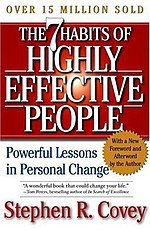This is probably the third or fourth time I have read this book and surprisingly I still feel that I will have to read it again. The book is very rich. Stephen Covey states,
"I would recommend that you not "see" this material as a book, in the sense that it is something to read once and put on a shelf.... [The] material is designed to a companion in the continual process of change and growth."Of the many books I have read, this is one of the few books that uses a lot of practical examples to illustrate its concepts. In my view, Stephen Covey possesses a teaching style that is comparable to that of one other person who taught similar principles many centuries ago (leave a comment if you can guess who I am alluding to).
The book teaches the following seven principles which Dr. Covey argues to be principles essential for high effectiveness in individuals, families, organizations, communities and nations.
- Be Proactive.
- Begin with the End in Mind.
- Put First Things First.
- Think Win/Win.
- Seek First to Understand, Then to be Understood.
- Synergize.
- Sharpen the Saw .
- Develop/tap into your mission statement.
- Identify your roles as they relate to your mission statement.
- Choose one or two goals to accomplish in each role in the next week.
- Schedule time to accomplish the goals you identified above.
- Adapt each day to prioritize your goals "while responding to unanticipated events, relationships, and experiences in a meaningful way."











0 comments:
Post a Comment